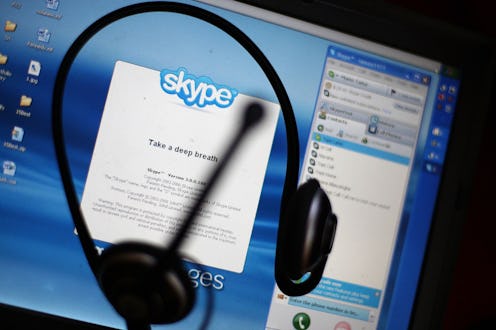News
Only Speak One Language? Skype's Got You Sorted
Truly exciting tech news Tuesday: Microsoft unveiled Skype Translator, a real-time language translator for Skype calls, a new app which should be rolled out in beta release by late 2014. Skype Translator was shown off at the Code Conference in by Microsoft's freshly-minted CEO Satya Nadella, and their corporate vice-president of Skype, Gurdeep Pall. The latter got to demo the live, on-stage translator call, speaking English while his colleague spoke German. It was a successful presentation all around, and it's hard not to find it pretty exciting.
The technology behind the this new app didn't just spring up overnight. It'd been in development at Microsoft for about ten years prior to Tuesday's Code Conference tease, and has released a similar software, Bing Translator, for Windows 8. The demo showed just how efficient, clear and recognizable the translations seem to be, albeit in a controlled and planned-out context — it pairs both audio and text translation, printing the words spoken at the bottom of the screen while a voice speaks the words aloud. If it performs for everyday consumers anything like what Tuesday's demonstration suggests, simply put, this seems like it could be a huge advance.
Writing for Microsoft's official blog following the event, Pall made it clear that the slightly geeky associations this might draw in your mind aren't lost on him, either.
As you saw from my conversation with Diana, it is early days for this technology, but the Star Trek™ vision for a Universal Translator isn’t a galaxy away, and its potential is every bit as exciting as those Star Trek examples. Skype Translator opens up so many possibilities to make meaningful connections in ways you never could before in education, diplomacy, multilingual families and in business.
This seems well and truly worth getting geeked-up about. It's worth remembering just how far our ability to stay connected across borders and oceans has come in the last several years, afforded by access to free programs like Skype. If this new breed of instantaneous translation takes hold in the same fashion, the landscape of human communication could be changed in major ways.
Anybody who's traveled in a foreign country, especially alone and without benefit of having learned the native tongue, can instantly recognize the significance of having such a utility. Whenever the app makes its way to mobile devices — the 2014 beta will be for Windows 8 — the lonely wanderer could suddenly be understood. This is to say nothing of the varied cross-cultural applications in health, education and business too, as well as simply the general health of human society.
After all, if it were as simple as placing a call to chat with someone you once couldn't have understood at all, the work of reaching across cultures and understandings might start to feel more, well, fun. Doesn't that sound like a slightly better world?
